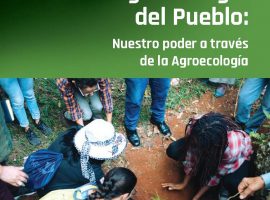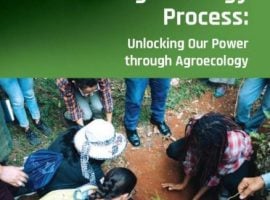Story by Colin Lawton, including contextual analysis and translation by Betty Fermin
Resilience. Fortitude. Determination. Strength. Care. Love.
Some of the terms that come to mind when I think of women now and throughout history. I’ve had the honor of being exposed to some amazing women throughout my life who were exemplary leaders, mothers, sisters, champions and unapologetically themselves in the face of their struggles and challenges. Women’s History Month is a celebration of all these aspects and then some. This year’s celebration, kicking off with International Women’s Day, speaks to me deeply as it comes on the heels of my incomparable experience on a 10-day delegation in Nicaragua with WhyHunger, where I had the honor of meeting a powerful group of women at the Gloria Quintanilla Cooperative – a women-led, coffee-producing community in Santa Julia, Managua, Nicaragua.
The delegation, coordinated by the Friends of the ATC – a solidarity network that supports Nicaragua’s Asociación de Trabajadores del Campo (Rural Workers’ Association) Nicaragua, brought a diverse group of people from grassroots & social justice organizations, farmworkers from across the US, Canada, Germany & students from Latin America together to gain first hand knowledge of how peasants of Nicaragua used agroecology, food sovereignty, feminism, socialism & anti-imperialism as a foundation of the society they have been building since the Sandinista Revolution of 1979. We spent 3 days living and working beside the women who each hold various positions of leadership in the community owned and operated cooperative in Santa Julia. We helped build biogas projects to create a sustainable source of cooking fuel for their homes, but more importantly, we heard their testimonies and learned from their stories.
Lola, one of the leaders of the cooperative, shared a recount of the before and after of life under the Somoza dictatorship and how things changed for them after to Sandinista revolution of 1979. She explained that the land was a coffee plantation originally owned by a German man in the early 1930s who enslaved his workers, paying them poor wages, with women making only half of the already menial wages men were paid, and offering poor living conditions with multiple families in small rooms with no beds, just boards, to sleep on. Once Anastasio Somoza Garcia came into power as the country’s dictator in 1937, conditions became even worse; food was only given to those who worked, leaving a worker’s wife and children to go hungry. Water was rationed off. Lola explained that women were horrifically abused, and many did not go to school nor did they receive medical care.
 After the ATC was formed and worked tirelessly in the shadows to organize workers and families, along with the Sandinista revolution, people began to feel a great sense of freedom as workers organized and community-minded living became the way of life. National sovereignty through agroecology and various tactics of anti-imperialism sparked the continually growing spirit of the peasants and peoples across Nicaragua. Ownership of the land by the people and food sovereignty became paramount in the new vision for the country. However, despite the fact the women were involved with working the land and caring for the home, they were still denied rights to their land, fair wages and safety.
After the ATC was formed and worked tirelessly in the shadows to organize workers and families, along with the Sandinista revolution, people began to feel a great sense of freedom as workers organized and community-minded living became the way of life. National sovereignty through agroecology and various tactics of anti-imperialism sparked the continually growing spirit of the peasants and peoples across Nicaragua. Ownership of the land by the people and food sovereignty became paramount in the new vision for the country. However, despite the fact the women were involved with working the land and caring for the home, they were still denied rights to their land, fair wages and safety.
When the cooperative was founded in 2008, it was a direct result of the women’s struggle and their demands for respect and the right to work, live and lead. One of the founding rules of living on the co-op land was there would be no harm to come to women at the hands of men. Their respect was demanded by virtue of their struggle and will to work. Over time, the men not only grew to respect them, but also worked to support them by working the land, helping at home or even taking care of the children while the women would seek education, something no longer treated as a luxury but now as a right for the women & their children after the ATC & Sandinista Government stepped in. The cooperative, once home to 35 families, has now grown to 75 families of 500 people – men, women and children – living and working collectively on the property.
“I’m very proud to be a campesino (farmer). The people from the city eat because of us. I am very proud to say I am from the countryside. I am no longer embarrassed or shy to take my produce to market and bring money back to my family. This is the legacy of all of them.”
– Doña Eloisa, President of the Gloria Quintanilla Cooperative
The house in which I stayed was led by the president of the cooperative, Doña Eloisa. The importance of interconnectedness resonated greatly with me as I was welcomed into her home. It didn’t take long to find comfort in knowing she would be mi madre (mother) for the time I was there. Doña Eloisa expressed emotions of joy and warmth as she welcomed us into the home. Though my Spanish is severely limited, years of hosting international guests made language a non-issue as far as how we communicated with each other. She’s 53, has 5 children & 7 grandchildren. In her testimony, she expressed how life has been for her personally growing up, as everyday living was quite difficult as she didn’t have access to much as a young woman, like a physical roof, schooling or even shoes.
“No one had anything either, so I wasn’t embarrassed. As I got older, I did [get embarrassed] because my bag was like my suitcase and it was like that till [I was] 15. I never went to school. At 14, I wore shoes. Now I admire kids that don’t even wear a broken flip-flop. I tell my son Luis about how I never had shoes and it’s just to remind him of what I suffered through. My mom and my great grandparents were all born here. After the 1980s, after the Sandinistas won the election, my life changed. I had my first kid at 15, then the other kids. They were born in the camp where we all lived. I had a goal that what I suffered my children would not have to live through and I think I’m meeting that goal, with faith in God and my fellow women.”
One of the greatest impacts Doña Eloisa and the women have found as a result of the Sandinista Revolution and the vigilant support of the ATC – going into its 41styear of operation this month – is the power in their voices, the grand realization of the rights they do have and the dissipation of the fears they once held.
“That’s what this government has brought to us: rights for women and children. This group of women has really gotten involved. We try to get backpacks for kids, we make sure the kids have what they need to go to school. I feel brave and proud because this community has what it has today, thanks to the energy of these women. Now when we knock on doors, they (the municipal government) hear us. We’ve seen a major change. Since we took the reins, our community has changed. If water doesn’t come, we need to make sure there’s a cistern. If the road doesn’t get fixed – like when Lola was working on the well in November – I got onto the tractors with Lea [another one of the cooperative’s leaders] to make sure it was fixed. We were directing the operation.”
One of the biggest issues the women have been tackling to this day has been their human rights as women, access to water and their right to land. Lola, began spearheading the project of building a well back in 2017, as the women have been fighting for access to water since 2010. The municipal government found it would be too costly to help them with such a project as it would mean helping other communities and putting $200,000 into the work. Skilled workers and adequate parts – including pipes, electrical wiring, submergible pump and tanks – are currently what’s really needed in order to complete the well, which is 90% done as of now. But it is because of the diligence and fight of the women that they were able to galvanize community support and volunteer efforts when the government was not as willing to step in. Access to water and land for the women means creating greater output of sustainable produce to help continue feeding the community and hopefully create more opportunity for work for others, especially the youth, on the land and build out the future of the people of Nicaragua.
 With faith in themselves, their agroecological processes, faith in the people, and faith in supporters like the ATC, Friends of the ATC, WhyHunger and other social movements, Eloisa, Lola and the women of Gloria Quintanilla see hope for the future of food sovereignty, land & gender rights equity, political education and so much more for the rural peoples of Nicaragua and the country as a whole.
With faith in themselves, their agroecological processes, faith in the people, and faith in supporters like the ATC, Friends of the ATC, WhyHunger and other social movements, Eloisa, Lola and the women of Gloria Quintanilla see hope for the future of food sovereignty, land & gender rights equity, political education and so much more for the rural peoples of Nicaragua and the country as a whole.







